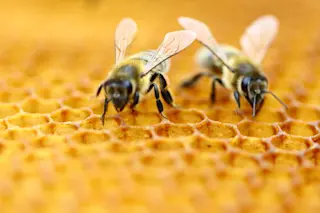Their constant smirking should have tipped us off, but we were so damned in love, dazzled by the glare from those latex-smooth exteriors, charmed by those adorably wobbly tail stands at SeaWorld. In fact—we never told anyone this—there was a day once on vacation when we nearly rented a Jet Ski, sans experience, sans even any real desire to Jet Ski, just on the conviction as we gazed across the harbor from our cabana that if we were to choose this day to make our Jet Ski debut, they would choose this day to do that thing they sometimes do, arcing up out of the surf at our side and keeping pace with us, singling us out as among the very crème of enlightened humanity.
Now, however, we're glad we didn't. If a team of Scottish marine biologists are to be believed—and if you've ever dipped even a toe into a body of Scottish water you have some sense of those people's rigor—dolphins are not to be trusted. They gossip. We know this because we know their names. Each bottlenose individual identifies itself by a unique pattern of whistles and clicks along the lines of woo-woo-wee-wee, or even woo-wee-woo-woo-wee-woo. What was not known until the Scottish research, however, is that a pair of dolphins use the name of a third dolphin when that third dolphin isn't present. In other words, dolphins gossip.
Maybe you're OK with this. Perhaps you're one of those people whose fondness for gossip is rivaled only by that of piranhas for the raw, quivering flesh of adventuresome canoeists. But for those like myself, solid and straightforward types who work with our hands and communicate mainly by tugging the brims of our sweat-stained work hats, the news of dolphin gossip comes as something of a punch to the stomach. Dolphins, we'd been led to believe, are a higher order of being, honorable and enlightened—Gandhis with blowholes. Even if our civilization were to collapse, eaten away from within by our unconquerable compulsion to whisper about our fellow humans behind their backs, dolphins, we assumed, would carry on.
Here on land, it is getting pretty bad for those of us who think people should keep their mouths shut. Hardly a day goes by without the launch of some shiny new magazine full of ill-informed speculation as to which actress is planning to have her baby underwater, which in midair, and which has a new tattoo of whose ex-husband's name where. The major television networks now devote an hour of early prime time to this sort of drivel. And the Internet has become gossip incarnate. From the venerable Drudge Report, whose whispers of infidelity nearly brought down a president, to the millions of teens traducing one another's sexual morality on MySpace, the growth of the Internet is driven by the urge to besmirch other people's reputations, the way it used to be driven by the urge to see other people with no clothes on.
This is a shame. For here in the taciturn, firm-handshake, eggs-and-grits-at-5 a.m. community, there was some early hope that information technology might put an end to gossip. We reasoned that gossip is time sensitive. It has value only when it's fresh, in that window of time between initial dissemination and universal saturation. Give a gossip addict the choice of hearing that O. J. Simpson murdered his wife in 1994 or that Donald Trump was seen driving a Honda Civic half an hour ago and they'll opt ravenously for the latter. Surely, we thought, once the transmission of information accelerates to light speed, and everyone knows everything the moment it happens, gossip will simply cease to exist. Gossip will simply become news.
But no. Gossip hangs on. As the speed of information has increased, so has the amount of information, meaning that while the shelf life of a juicy rumor may have decreased by, say, 80 percent, there are now four fresh, juicy rumors waiting to take its place, thus enabling women in salons to keep wagging their tongues with no noticeable interruption.
On the upside, gossip has certainly become more accurate. Back in olden times, a slander whispered behind a paper fan in the ladies' cloakroom of a royal ball could fester and metastasize for years before anyone bothered to check if it was true or not, by which point the wronged party could easily have been beheaded or dethroned or condemned to a life of spinsterhood. Nowadays, if I wish to start spreading the rumor that my nemesis, the dreadful and sinister Marquis of Brooklyn, keeps an elephant for sexual purposes, I am constrained by a universe of established and instantly accessible facts. Here is a Google Earth satellite photo of his estate—no elephant enclosure, hayrick, or dung heap visible. Here is the online text of last month's Maxim, in which his supermodel wife confesses a lethal allergy to all pachyderms. And here is his blog, via which the recipients of my ugly rumor can immediately and anonymously ask him whether it's true or not, and via which he may instantly retaliate with something just as damaging about me.
This is progress, I concede. It has been at least 10 years since someone screamed and dropped their groceries in the street at the sight of me because they had erroneously been led to believe I was dead or in a Tibetan monastery. On the other hand, gossiping continues entirely unchecked by the banality of what now passes for dirt. A distant acquaintance approached me at a party a few weeks ago, looked around to ensure we weren't being eavesdropped upon, and asked me if it was true that I was dating a woman who played the piano. It was, I confirmed, but how did he know? He tapped his nose, mentioned "certain sources," and slunk ecstatically away.
Presumably, this is all about to get much worse. The controversial futurist Ray Kurzweil predicts in his book The Singularity Is Near that we are but a handful of decades from a transformative discontinuity in human evolution that will bring us an explosive expansion of intelligence and information. Kurzweil has his skeptics—most of whose counterarguments can be summarized as, nah, that would just be too weird—but even if he's grandiose in his predictions by several orders of magnitude, it still seems a safe bet that we are heading into a world where discretion has no meaning. There will be no secrets in the year 2050. If actress Uma Thurman and I, both wearing sunglasses, meet for a private conversation over midmorning coffee, the news of our assignation will have saturated the globe and our lunar colonies by the time we—or she, more likely, given certain puzzling trends in my personal finances—has asked for the check. Already, those partial to gossip are able to feed their addiction without leaving the house; in the future they will doubtless stay in bed and have a steady stream of scuttlebutt pumped directly into their brains via a tube of some unimaginable description.
Then again, perhaps not. Regular readers will appreciate that I always try to close with a note of optimism. What we might discover, as our world slides deeper into the quicksand of information, is that the joy of gossip is dependent on a level of privacy. Is not part of the thrill of discussing Friend A's botched plastic surgery that Friend A doesn't know about the discussion but is staring past what's left of his nose at some sort of clinical ceiling fan in Malibu, oblivious to what's being said about him? Would we be so quick to gossip if there was a decent chance that the person we were talking about might actually be listening in?
I say that we will not be so quick to gossip under such circumstances and that such circumstances may very well be the future. As information teems and breeds, as the light of knowledge brightens, it will come to flood those dark corners of our society in which the gossips used to skulk. They can talk about us if they like, but they will do so as we listen. As the singularity approaches, their tongues will fall silent.
Unless, of course, they choose to gossip about dolphins—and given the shocking condition of Woo-woo-wee-wee's blowhole lately, I could hardly blame them if they did.












